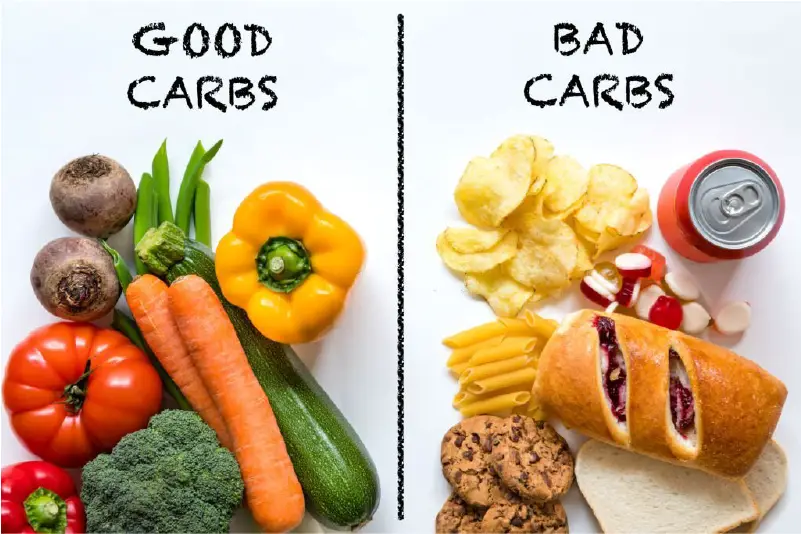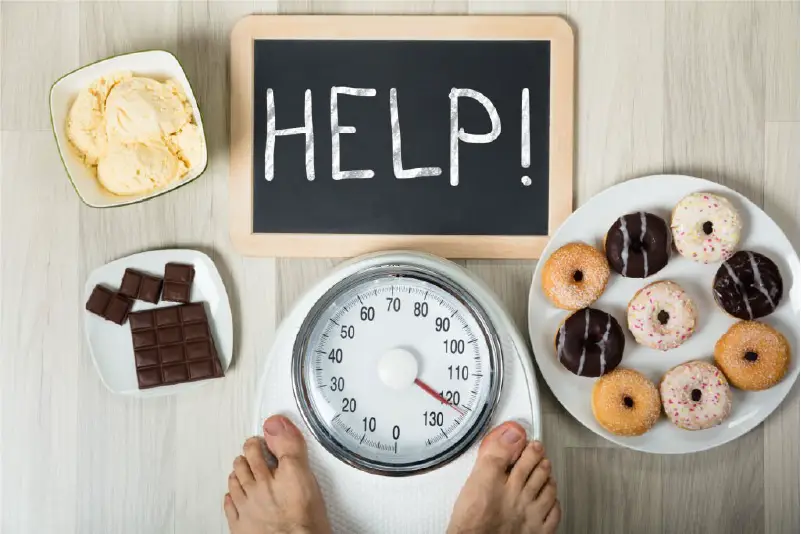Table of Contents Show
Carbohydrates, or carbs for short, are one of the three macronutrients that provide energy for the body, along with protein and fat. Carbs are found in many foods, such as grains, fruits, vegetables, legumes, dairy products, and sweets. However, not all carbs are created equal. Some are more nutritious and beneficial for health than others.
Many people wonder if eating carbs can make them gain weight. This is a common question, especially among those who follow low-carb diets or want to lose weight. The answer is not so simple, as there are many factors that influence weight gain and loss, such as calorie intake, physical activity, metabolism, hormones, genetics, and lifestyle.
In this article, we will explore Do Carbs Make You Fat, and provide some tips on how to choose the best carbs for your health and weight goals.
What are carbs and How do carbs make you fat??


Carbs are molecules that consist of carbon, hydrogen, and oxygen atoms. They can be classified into three main types: sugars, starches, and fiber.
Sugars are the simplest form of carbs, composed of one or two sugar units. They are found naturally in fruits, honey, milk, and some vegetables. They are also added to many processed foods and drinks, such as candy, cookies, cakes, soda, and juice. Sugars are quickly digested and absorbed into the bloodstream, raising blood sugar levels and providing a fast source of energy.
Starches are complex carbs that consist of many sugar units linked together. They are found in foods like bread, rice, pasta, potatoes, corn, beans, and peas. Starches take longer to digest and break down into glucose (the main form of sugar used by the body). They provide a steady source of energy and help keep blood sugar levels stable.
Fiber is a type of carb that cannot be digested by human enzymes. It is found in plant foods like fruits, vegetables, whole grains, nuts, seeds, and legumes. Fiber passes through the digestive system mostly intact, adding bulk to the stool and promoting bowel health. Fiber also helps lower cholesterol levels, regulate blood sugar levels, prevent constipation, and reduce the risk of some diseases.
Carbs have several functions in the body:
- They provide energy for the brain and muscles.
- They help control blood glucose (sugar) levels and insulin (a hormone that regulates glucose) response.
- They support the growth and maintenance of cells and tissues.
- They spare protein from being used as an energy source.
- They enhance the flavor and texture of foods.
The amount of carbs that a person needs depends on their age, sex, activity level, health status, and personal preferences. The Dietary Guidelines for Americans 2020-2025 recommend that adults get 45% to 65% of their daily calories from carbs. This means that someone who eats 2,000 calories per day should aim for about 225 to 325 grams of carbs per day.
why do carbs make you fat?


The fact is that carbs do not cause instant weight gain. However, eating too many calories from any source (carbs, protein, or fat) can lead to weight gain over time. This is because the body stores excess calories as fat for later use.
Some people may think that carbs are more fattening than other macronutrients because they trigger insulin secretion. Insulin is a hormone that helps glucose enter the cells to be used or stored as glycogen (a form of starch). Insulin also inhibits fat breakdown and promotes fat storage. Therefore, some people believe that eating carbs causes insulin spikes that prevent fat burning and promote fat accumulation.
However, this theory is not supported by scientific evidence. Several studies have shown that eating carbs does not make a difference in body fat loss or gain compared to eating fat or protein, as long as the total calorie intake is the same. This holds true whether people overeat or undereat calories.
In fact, some studies have suggested that eating more carbs may actually help with weight loss by increasing satiety (the feeling of fullness), reducing appetite, enhancing thermogenesis (the production of heat by the body), and improving metabolic health .
The key is to choose high-quality carbs that are rich in fiber and nutrients over low-quality carbs that are refined and processed. High-quality carbs include whole grains (such as oats, quinoa, barley), fruits (such as apples, bananas, berries), vegetables (such as broccoli, carrots, spinach), legumes (such as beans, lentils, peas), and dairy products (such as milk, yogurt, cheese). Low-quality carbs include white bread, white rice, white pasta, pastries, cookies, cakes, candy, soda, and juice.
High-quality carbs have several advantages over low-quality carbs:
- They provide more vitamins, minerals, antioxidants, and phytochemicals that are essential for health and disease prevention.
- They have a lower glycemic index (GI) and glycemic load (GL), which means they cause smaller and slower rises in blood sugar and insulin levels.
- They have more fiber, which helps lower cholesterol levels, regulate blood sugar levels, prevent constipation, and reduce the risk of some diseases.
- They are more filling and satisfying, which helps control hunger and calorie intake.
Tips for incorporating low-carb diets in a healthy and balanced way


Here are some tips on how to include low-carb diets in a healthy and balanced way:
- Aim for at least half of your grains to be whole grains. Look for the word “whole” before the name of the grain on the ingredient list. Examples of whole grains are whole wheat, oatmeal, brown rice, buckwheat, bulgur, and popcorn.
- Eat a variety of fruits and vegetables every day. Choose fresh, frozen, canned, or dried fruits and vegetables that are low in added sugars and sodium. Aim for at least 2 cups of fruit and 2.5 cups of vegetables per day for a 2,000-calorie diet.
- Include legumes in your meals at least twice a week. Legumes are a great source of plant-based protein, fiber, iron, folate, and other nutrients. They can also help lower blood pressure and cholesterol levels. Examples of legumes are beans, lentils, peas, soybeans, tofu, tempeh, and hummus.
- Choose low-fat or fat-free dairy products or fortified plant-based alternatives. Dairy products provide calcium, protein, vitamin D, and other nutrients that are important for bone health. Plant-based alternatives include soy milk, almond milk, oat milk, and others. Make sure they are fortified with calcium and vitamin D.
- Limit your intake of added sugars. Added sugars are sugars that are added to foods or drinks during processing or preparation. They do not include the natural sugars found in fruits, milk, and some vegetables. Added sugars provide empty calories that can contribute to weight gain and health problems. The Dietary Guidelines for Americans 2020-2025 recommend that less than 10% of your daily calories come from added sugars. This means that someone who eats 2,000 calories per day should limit their added sugar intake to less than 50 grams or 12 teaspoons per day.
- Watch your portion sizes. Eating too much of any food can lead to weight gain and health problems. Use measuring cups, spoons, or scales to measure your food portions. You can also use visual cues to estimate your portions. For example, a cup of cooked pasta is about the size of a tennis ball, a medium apple is about the size of a baseball, and an ounce of cheese is about the size of four dice.
- Balance your carb intake with protein and fat. Carbs are not the only macronutrients that affect your weight and health. Protein and fat also play important roles in providing energy, building and repairing tissues, regulating hormones, and supporting various bodily functions. Protein and fat can also help you feel full and satisfied after a meal. The Dietary Guidelines for Americans 2020-2025 recommend that adults get 10% to 35% of their daily calories from protein and 20% to 35% from fat. This means that someone who eats 2,000 calories per day should aim for about 50 to 175 grams of protein and 44 to 78 grams of fat per day.
FAQs about Do Carbs Make You Fat
Some of the Frequently Asked Questions about Do Carbs Make You Fat:
What are some examples of high-quality carbs?
High-quality carbs are carbs that are rich in fiber and nutrients and have a low glycemic index (GI) and glycemic load (GL). Some examples of high-quality carbs are:
- Whole grains (such as oats, quinoa, barley)
- Fruits (such as apples, bananas, berries)
- Vegetables (such as broccoli, carrots, spinach)
- Legumes (such as beans, lentils, peas)
- Dairy products (such as milk, yogurt, cheese)
What are some examples of low-quality carbs?


Low-quality carbs are carbs that are refined and processed and have a high glycemic index (GI) and glycemic load (GL). They also tend to be low in fiber and nutrients. Some examples of low-quality carbs are:
- White bread
- White rice
- White pasta
- Pastries
- Cookies
- Cakes
- Candy
- Soda
- Juice
How many carbs should I eat per day to lose weight?


There is no one-size-fits-all answer to this question, as different people have different calorie and nutrient needs, preferences, and goals. However, some general guidelines can help you determine how many carbs you should eat per day to lose weight.
First, you need to estimate your daily calorie requirement based on your age, sex, height, weight, and activity level. You can use online calculators or formulas to do this, or consult a registered dietitian or health professional. A common formula is the Mifflin-St Jeor equation:
- For men: (10 x weight in kg) + (6.25 x height in cm) – (5 x age in years) + 5
- For women: (10 x weight in kg) + (6.25 x height in cm) – (5 x age in years) – 161
This gives you your resting metabolic rate (RMR), which is the number of calories your body burns at rest. To get your total daily energy expenditure (TDEE), you need to multiply your RMR by an activity factor that reflects how active you are:
- Sedentary (little or no exercise): 1.2
- Lightly active (light exercise 1-3 days/week): 1.375
- Moderately active (moderate exercise 3-5 days/week): 1.55
- Very active (hard exercise 6-7 days/week): 1.725
- Extremely active (very hard exercise or physical job): 1.9
For example, if you are a 30-year-old woman who weighs 60 kg, is 165 cm tall, and exercises moderately 3 times a week, your TDEE would be:
(10 x 60) + (6.25 x 165) – (5 x 30) – 161 = 1,374 calories per day
1,374 x 1.55 = 2,130 calories per day
Second, you need to create a calorie deficit to lose weight. This means that you need to consume fewer calories than you burn. A safe and sustainable rate of weight loss is about 0.5 to 1 kg per week, which requires a daily calorie deficit of about 500 to 1,000 calories. However, this may vary depending on your individual factors and goals. You can achieve a calorie deficit by eating less, exercising more, or both.
For example, if you want to lose 0.5 kg per week, you need to reduce your daily calorie intake by about 500 calories. If your TDEE is 2,130 calories per day, this means that you should aim for about 1,630 calories per day.
Third, you need to decide how many carbs you want to eat within your calorie budget. As mentioned earlier, the Dietary Guidelines for Americans 2020-2025 recommend that adults get 45% to 65% of their daily calories from carbs. This means that someone who eats 2,000 calories per day should aim for about 225 to 325 grams of carbs per day.
However, some people may prefer to eat more or less carbs depending on their personal preferences and goals. For example, some people may follow low-carb diets that limit their carb intake to less than 50 grams, 100 grams, or 150 grams per day . These low-carb diets may have some benefits for weight loss, blood sugar control, and appetite regulation, but they may also have some drawbacks, such as nutrient deficiencies, ketosis, and long-term sustainability .
Therefore, the optimal amount of carbs for weight loss may vary from person to person. A good way to find out how many carbs work best for you is to experiment with different amounts and monitor your weight, hunger, energy, mood, and health markers. You can also consult a registered dietitian or health professional for personalized advice.
For example, if you want to eat 40% of your calories from carbs, and your calorie goal is 1,630 calories per day, this means that you should aim for about 163 grams of carbs per day.
163 grams of carbs = 40% x 1,630 calories / 4 calories per gram
To summarize, the number of carbs you should eat per day to lose weight depends on your calorie requirement, calorie deficit, and carb preference. You can use the following formula to calculate your carb goal:
Carb goal (in grams) = Carb percentage x Calorie goal / 4
How can I track my carb intake?
There are several ways to track your carb intake, such as:
- Reading nutrition labels. Nutrition labels provide information on the amount of carbs, fiber, sugar, and other nutrients in a serving of food or drink. You can use this information to calculate how many carbs you are consuming and compare it to your carb goal. However, be aware that nutrition labels may not be accurate or consistent, and they may not include all the ingredients or additives in a product.
- Using online databases or apps. Online databases or apps allow you to search for the nutritional values of various foods and drinks, including their carb content. Some examples are the USDA FoodData Central, MyFitnessPal, Cronometer, and Carb Manager. You can use these tools to log your food intake and track your carb intake over time. However, be aware that online databases or apps may not have all the foods or brands that you eat or drink, and they may rely on user-generated data that may not be accurate or verified.
- Using a food scale or measuring cups and spoons. A food scale or measuring cups and spoons can help you measure the weight or volume of the foods and drinks that you consume. You can then use online databases or apps to look up the carb content of those foods and drinks based on their weight or volume. This can help you get a more accurate estimate of your carb intake than relying on nutrition labels or eyeballing portions. However, be aware that using a food scale or measuring cups and spoons may not be convenient or practical for some people or situations.
- Using a glucose meter or a continuous glucose monitor (CGM). A glucose meter or a CGM can help you measure your blood glucose (sugar) levels before and after eating or drinking. This can help you see how different foods and drinks affect your blood glucose levels and insulin response. This can also help you adjust your carb intake according to your blood glucose goals and tolerance. However, be aware that using a glucose meter or a CGM may not be necessary or suitable for everyone, and they may require a prescription, training, and maintenance.
The best way to track your carb intake may depend on your personal preferences, goals, and resources. You may also choose to combine different methods or switch between them as needed. The most important thing is to find a way that works for you and helps you achieve your health and weight goals.
Conclusion on do carbs make you gain weight


Carbs are one of the three macronutrients that provide energy for the body. They have several functions and benefits for health and well-being. However, eating too many calories from any source, including carbs, can lead to weight gain over time.
The amount of carbs that a person needs depends on their age, sex, activity level, health status, and personal preferences. The Dietary Guidelines for Americans 2020-2025 recommend that adults get 45% to 65% of their daily calories from carbs.
However, some people may prefer to eat more or less carbs depending on their weight loss goals and outcomes. The optimal amount of carbs for weight loss may vary from person to person.
There are several ways to track your carb intake, such as reading nutrition labels, using online databases or apps, using a food scale or measuring cups and spoons, or using a glucose meter or a CGM.
The best way to include carbs in your diet in a healthy and balanced way is to choose high-quality carbs that are rich in fiber and nutrients over low-quality carbs that are refined and processed.
High-quality carbs include whole grains, fruits, vegetables, legumes, and dairy products. Low-quality carbs include white bread, white rice, white pasta, pastries, cookies, cakes, candy, soda, and juice.
You should also balance your carb intake with protein and fat, watch your portion sizes, and limit your intake of added sugars.
By following these tips, you can do carbs make you gain weight. Carbs are not the enemy of weight loss. They are an essential and delicious part of a balanced diet.




